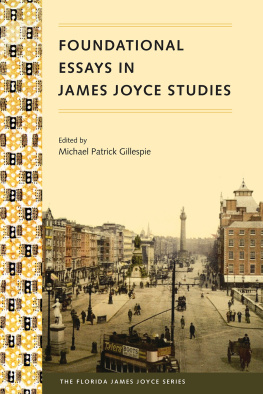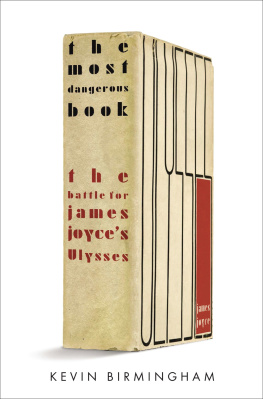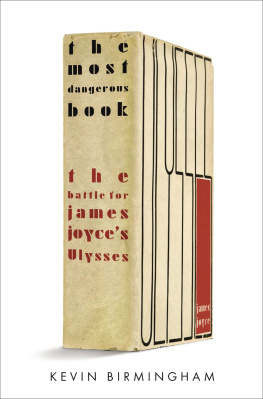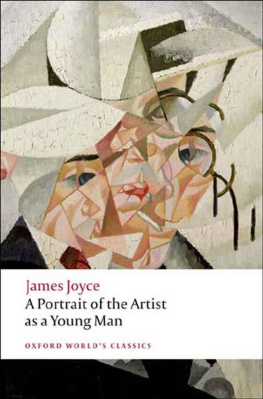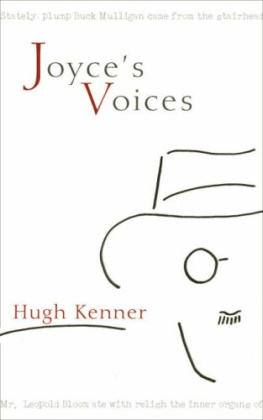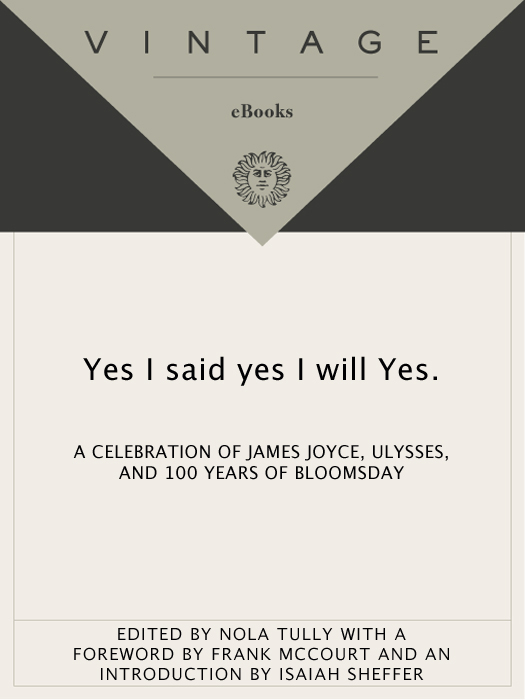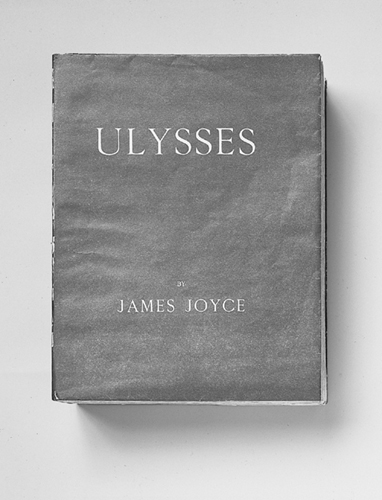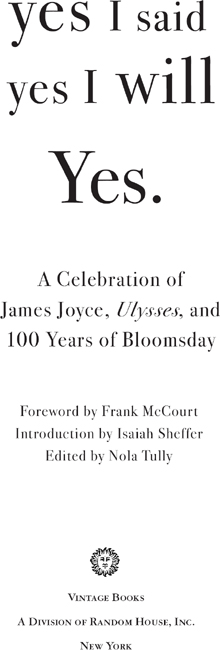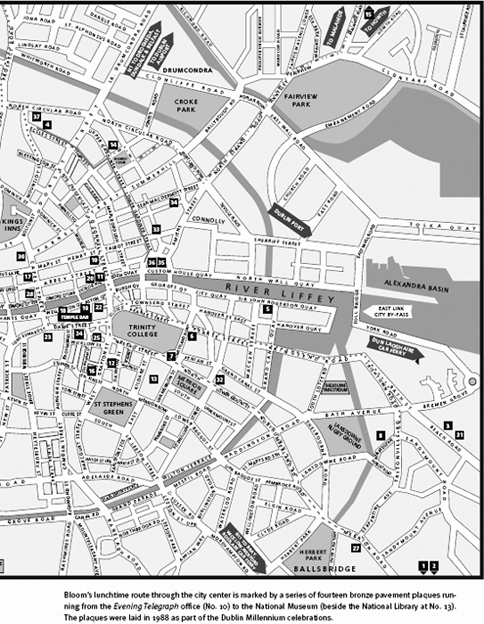Contents

The Noble Savage of the Novel:
Joyce the Artist
The Epic of the Age:
Themes of Ulysses
Foreword
Frank McCourt
The title of the thesis I wrote at Brooklyn College in May 1964 was Oliver St. John Gogarty: A Critical Study. Critical, my arse. I was no more qualified to write a critical study of Gogarty than I was to drive an eighteen-wheeler in a New York City rush hour. But the professors accepted it (some admired it) and here it is before me. Here, bristling with footnotes and backed up, not merely with one thirty-one-item bibliography, but also with a supplementary bibliography to show I knew my way around Catullus and Horace and Petronius and could show how indebted Gogarty was to them, how he often imitated them.
If youre holding this book in your hands you must know that Oliver St. John Gogarty was, for a while, a pal of James Joyce. Youll know how they knocked around together, Gogarty roistering, Joyce watching, watching, and making notes.
The thesis opens with a quote from Gogartys It Isnt This Time of Year at All:
It is with the unruly, the formless, the growing and illogical I love to deal. Even my gargoyles are merry and bright; my outer darkness by terror is unthronged. My thoughts are subjected to no rules. Behold the wings upon my helmet and my unfettered feet. I can fly backwards and forwards in time and space.
My comment on the above was, The words are carefree, heroic and joyous. They come from the pen of Oliver St. John Gogarty, surgeon, poet, athlete, wit, senator, aviator, and close friend of great Irish literary figures.
What I omitted in this catalogue of Gogartys activities and talents was his friendship with the man who made him immortal, James Joyce. It was an immortality Gogarty did not relish, an immortality that plunged him into a resentment of Joyce from which he never emerged.
You are now wondering: Why is this man going on about Gogarty when its Joyce were concerned with here?
Here is the answer: I wrote my thesis on Gogarty because I admired him, his diversity, his talents, his devil-may-care attitude toward life. If offered the chance for another life, I would ask to be reincarnated as Oliver St. John Gogarty.
I could have attempted a thesis on Joyce but the world was already busy with a thousand such tomes. So I saw Gogarty as the next best thing, a door to the work, the mind, the life of The Master.
Nineteen sixty-four, the year of my forgettable thesis, was the sixtieth anniversary of Bloomsday. (Richard Ellmann had published his masterly biography in 1959.) Joyceans might have marked June 16 on their calendars in 1964 but youd search in vain for the kind of celebration the day has engendered since. In certain places Ulysses, all of it, is read by people, some who havent the foggiest notion of what theyre reading. Still, the book sings in your head for a long time and you wont forget its charactersBloom, Stephen, Molly, Blazes Boylan, or scenes. Its your life.
At these readings there is still a thrill in the crowd with the opening line that Joyceans know refers to my man, Gogarty: Stately, plump Buck Mulligan came from the stairhead . Were off on a journey through Dublin and Ireland and family and Catholicism and eroticism and love and infidelity. The journey ends on a powerful, tumescent note, yes I will Yes. (Note the uppercase Y on the final Yes. This is not an end but a beginning.)
Let us digress a bit here. Joyce wont mind and Im sure you wont. Here is a strange fact: Neither Joyce nor Proust ever won the Nobel Prize. Wags have suggested they were ignored because the members of the Nobel Literature Committee were incapable of reading their work.
Another fact: According to the American publisher, Random House, Ulysses was the number one novel in the twentieth century.
Number one in what way? Number of people who actually read it? Number of people who simply considered it number one? Unknown, at least to me.
There are high school teachers teaching Ulysses. Id like to knowhow and, most of all, why? Before you look at the opening line of the book you ought to have a knowledge of the geography and history of Dublin and Ireland, you ought to know your way around Catholicism and, maybe, some Judaism (out of respect to Leopold Bloom).
We annually commemorate Ulysses because the action, the story, takes place in one day, June 16, 1904. It is a story, a very simple story, in its broad outlines. It has a structure that is based generally, very generally, on Homers Odyssey.
But there are layers and themes and connotations that, if youre in the mood, will keep you busy the rest of your life. Because I grew up in Limerick, the only city in Ireland with an anti-Semitic blot on its escutcheon, Ive followed the Jewish thread in Ulysses. In January 1904 a Limerick priest, John Creagh, stirred the people up against the Jews who, he said, had shed Christian blood. Richard Ellmann says, Eighty members of the Jewish community were driven out, and only forty were left. Then Creagh was withdrawn from the community.
(That same Creagh, obviously a madman and not the first to be tolerated by the church, was then sent to Australia where he preached against the aborigines.)
If Leopold Bloom is Jewish and anti-Semitism a theme in Ulysses, why did Joyce fail to mention the Limerick incident? He must have known about it. Ellmann tells us he did, and that makes it gospel. (If, like me, you want to pursue the Jewish connection, theres a book by Ira B. Nadel, Joyce and the Jews, University of Iowa Press, 1989.) Again, the answer is unknown.
Beware the solemnity that might descend on gatherings of Joyceans on June 16. The man himself was anything but solemn and his shade would surely groan if he could witness the extremes of academia in his name. I think hed enjoy the book you hold in your hand. Hed give Isaiah Sheffer a pat on the back for all those Bloomsdays at Symphony Space where readers and listeners/spectators have sailed on carpets of verbal delight.
I was there at The Creation on June 16, 1982.
Twenty-three years!
May Isaiah forgive me for missing three Bloomsdays in all those years, though I want to remind His Lordship that my brother and I flew from Chicago Just For The Day in 1988
You dont have to be an actor to read on the Symphony Space stage. Ive stood at a microphone with beer salesmen, accountants, The Retired, businessmen, editors, and even, God help us, professors who knew what they were reading and who, offstage, could explicate.


